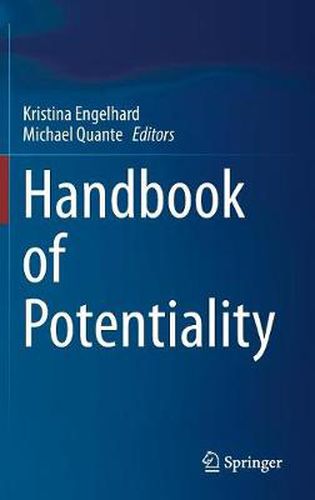Readings Newsletter
Become a Readings Member to make your shopping experience even easier.
Sign in or sign up for free!
You’re not far away from qualifying for FREE standard shipping within Australia
You’ve qualified for FREE standard shipping within Australia
The cart is loading…






This title is printed to order. This book may have been self-published. If so, we cannot guarantee the quality of the content. In the main most books will have gone through the editing process however some may not. We therefore suggest that you be aware of this before ordering this book. If in doubt check either the author or publisher’s details as we are unable to accept any returns unless they are faulty. Please contact us if you have any questions.
This volume congregates articles of leading philosophers about potentials and potentiality in all areas of philosophy and the empirical sciences in which they play a relevant role. It is the first encompassing collection of articles on the metaphysics of potentials and potentiality.
Potentials play an important role not only in our everyday understanding of objects, persons and systems but also in the sciences. An example is the potential to become an adult human person. Moreover, the attribution of potentials involves crucial ethical problems. Bioethics makes references to the theoretical concept potential without being able to clarify its meaning. However, despite its relevance it has not been made subject of philosophical investigation. Mostly, potentials are regarded as a subspecies of dispositions. Whilst dispositions are a flourishing field of research, potentials as such have not come into focus. Potentials like dispositions are modal properties. But already a first glance at the metaphysics of potentials shows that concerning their ascription potentials are more problematic than dispositions since potential means that an entity has the potential to acquire a property in the future. Therefore, potentials involve a time structure of the entities in question that is much more complex than those of dispositions.
This handbook brings this important concept into focus in its various aspects for the first time. It covers the history of the concept as well as contemporary systematic problems and will be of special interest for philosophers in the fields of general metaphysics, philosophy of science and ethics, especially bioethics. It will also be of interest to scientists and persons concerned with bioethical problems.
$9.00 standard shipping within Australia
FREE standard shipping within Australia for orders over $100.00
Express & International shipping calculated at checkout
This title is printed to order. This book may have been self-published. If so, we cannot guarantee the quality of the content. In the main most books will have gone through the editing process however some may not. We therefore suggest that you be aware of this before ordering this book. If in doubt check either the author or publisher’s details as we are unable to accept any returns unless they are faulty. Please contact us if you have any questions.
This volume congregates articles of leading philosophers about potentials and potentiality in all areas of philosophy and the empirical sciences in which they play a relevant role. It is the first encompassing collection of articles on the metaphysics of potentials and potentiality.
Potentials play an important role not only in our everyday understanding of objects, persons and systems but also in the sciences. An example is the potential to become an adult human person. Moreover, the attribution of potentials involves crucial ethical problems. Bioethics makes references to the theoretical concept potential without being able to clarify its meaning. However, despite its relevance it has not been made subject of philosophical investigation. Mostly, potentials are regarded as a subspecies of dispositions. Whilst dispositions are a flourishing field of research, potentials as such have not come into focus. Potentials like dispositions are modal properties. But already a first glance at the metaphysics of potentials shows that concerning their ascription potentials are more problematic than dispositions since potential means that an entity has the potential to acquire a property in the future. Therefore, potentials involve a time structure of the entities in question that is much more complex than those of dispositions.
This handbook brings this important concept into focus in its various aspects for the first time. It covers the history of the concept as well as contemporary systematic problems and will be of special interest for philosophers in the fields of general metaphysics, philosophy of science and ethics, especially bioethics. It will also be of interest to scientists and persons concerned with bioethical problems.